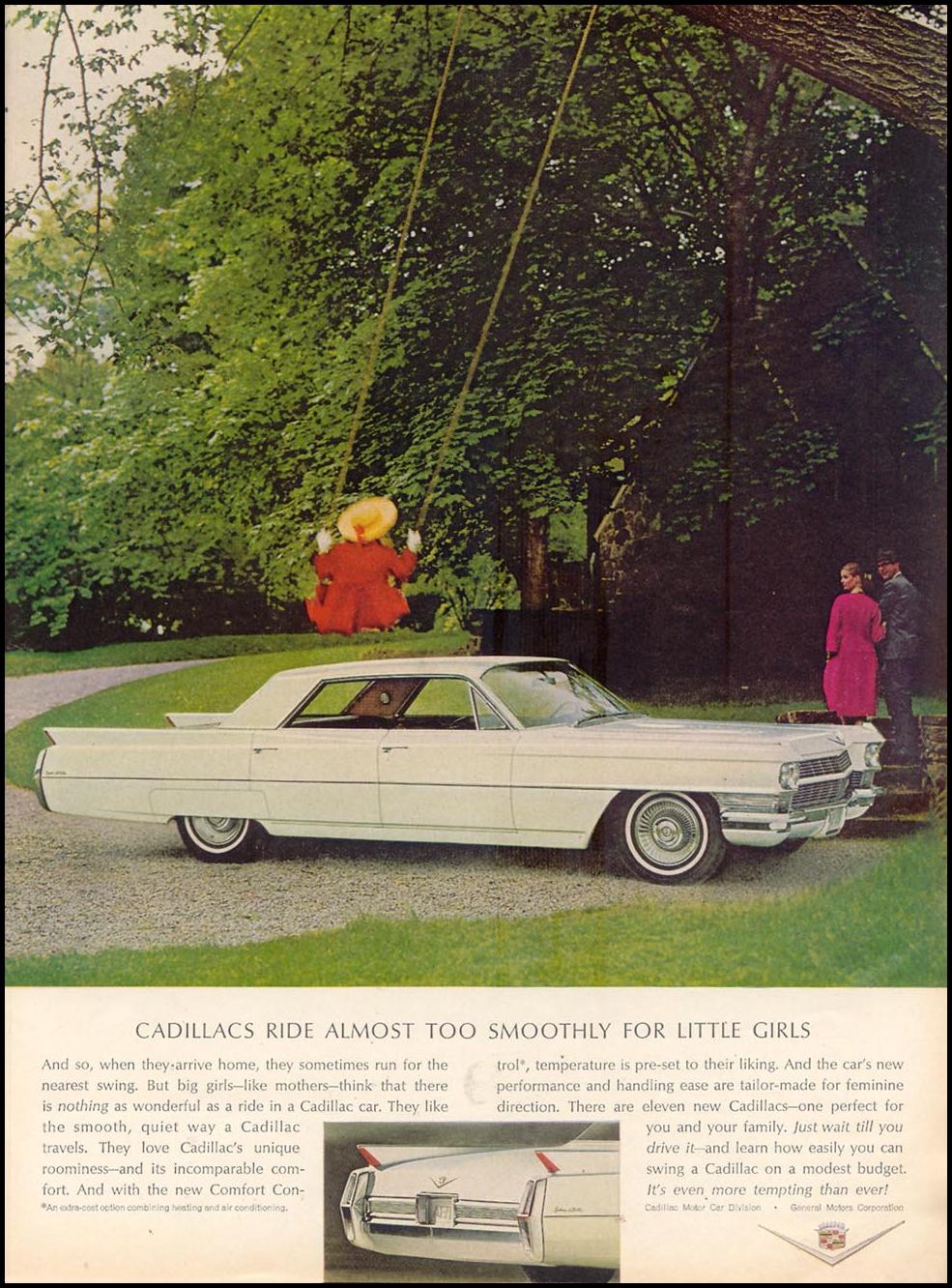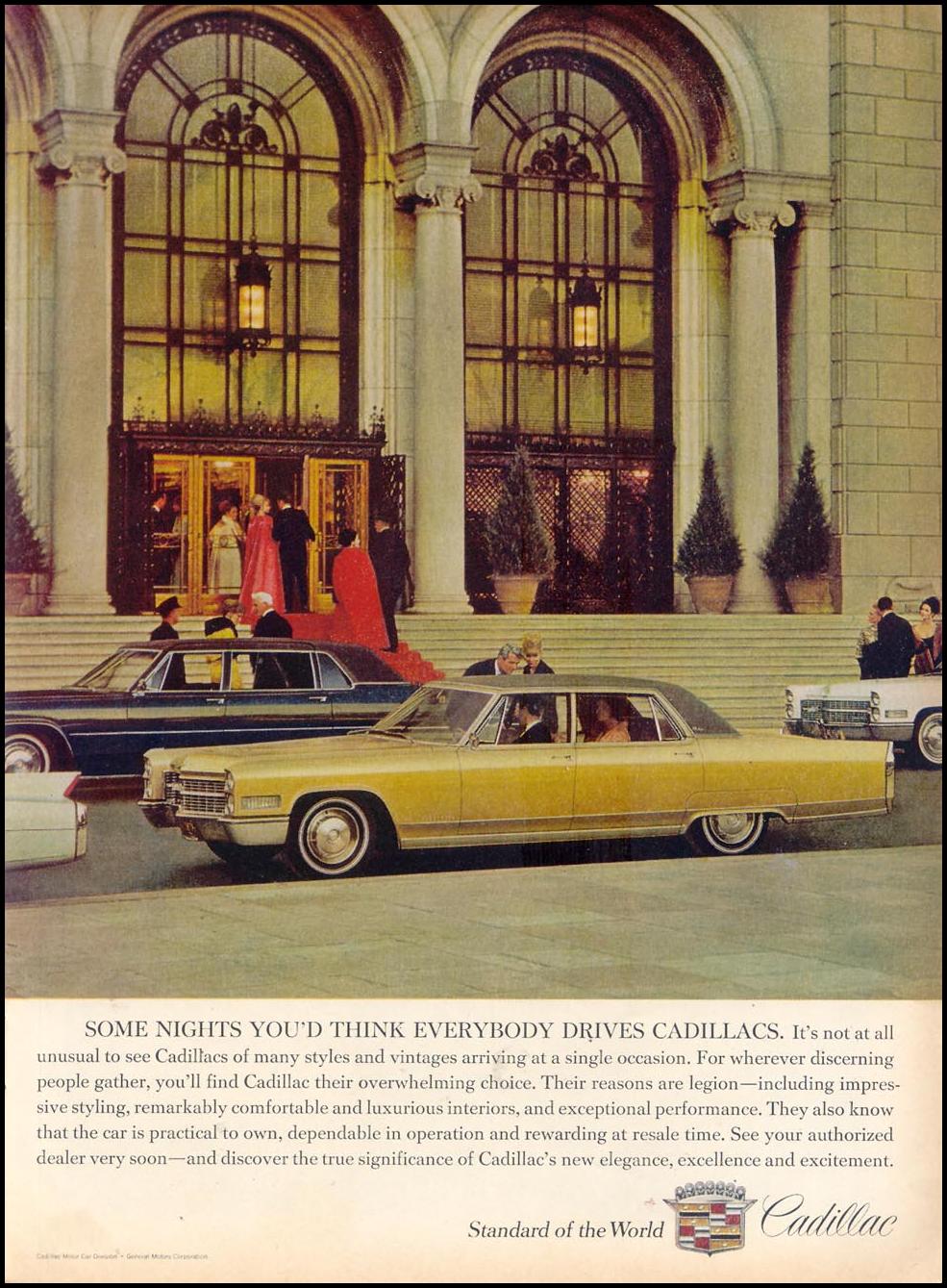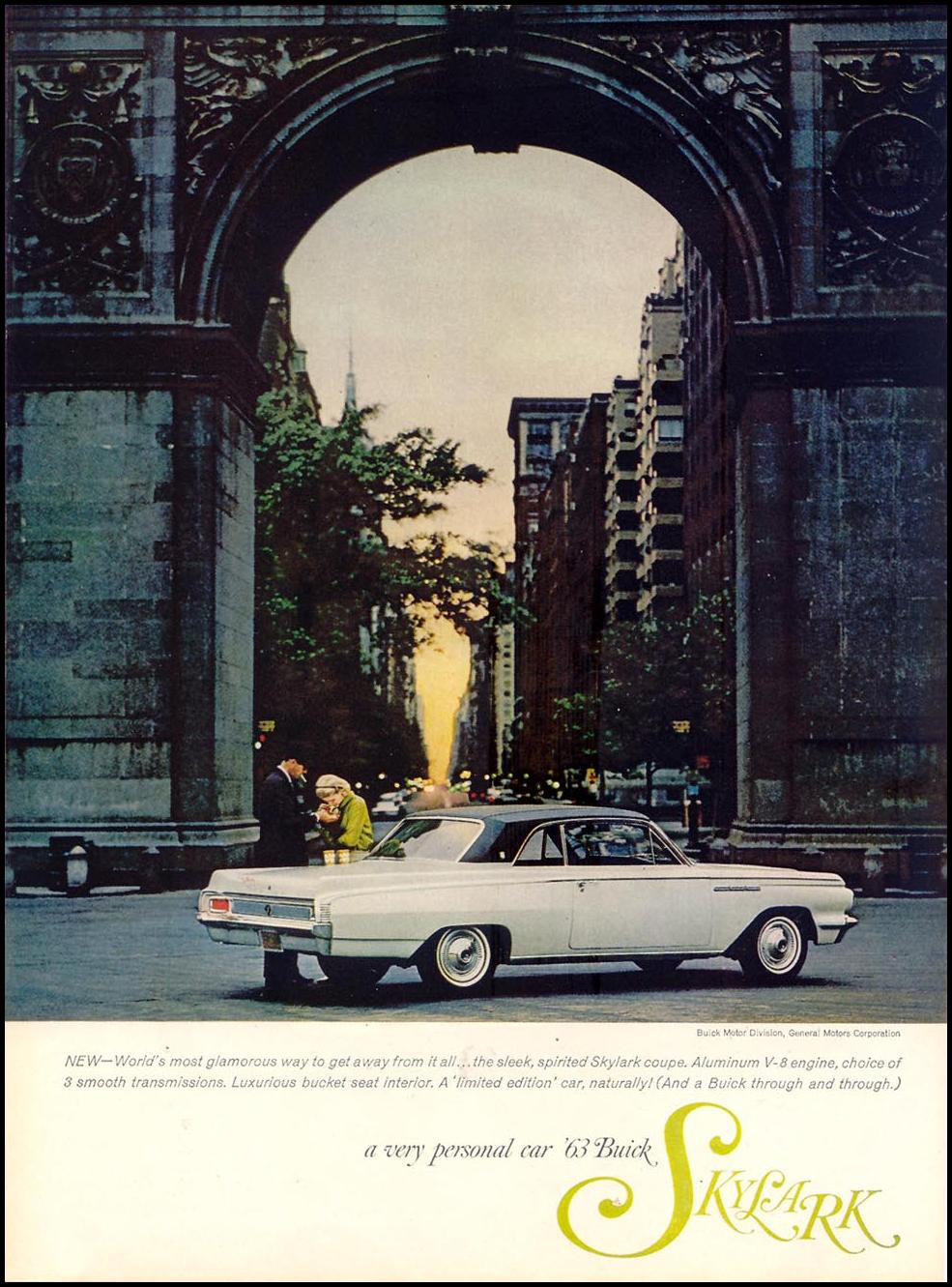.
Ford Motor Company advertisement for Ford automobiles: Life, 19 May 1967 (Gallery of Graphic Design)

General Motors advertisement for Cadillac automobiles: Time, 6 December 1963 (Gallery of Graphic Design)

General Motors advertisement for Cadillac automobiles: Time, 11 March 1966 (Gallery of Graphic Design)

Ford Motor Company advertisement for Lincoln automobiles: Time, 3 March 1966 (Gallery of Graphic Design)
Ford Motor Company advertisement for Ford automobiles: Sports Illustrated, 11 May 1959 (Gallery of Graphic Design)

Ford Motor Company advertisement for Lincoln automobiles: Time, 7 December 1962 (Gallery of Graphic Design)

Ford Motor Company advertisement for Lincoln automobiles: Time, 17 November 1961 (Gallery of Graphic Design)

General Motors advertisement for Chevrolet automobiles: Time, 25 May 1959 (Gallery of Graphic Design)

General Motors advertisement for Chevrolet automobiles: Sports Illustrated, 11 May 1959 (Gallery of Graphic Design)

Ford Motor Company advertisement for Lincoln automobiles: Time, 15 September 1958 (Gallery of Graphic Design)
General Motors advertisement for Oldsmobile automobiles: Life, 8 April 1957 (Gallery of Graphic Design)

General Motors advertisement for Buick automobiles: Time, 7 December 1962 (Gallery of Graphic Design)

General Motors advertisement for Cadillac automobiles: Life, 2 February 1959 (Gallery of Graphic Design)

General Motors advertisement for Cadillac automobiles: Saturday Evening Post, 9 May 1955 (Gallery of Graphic Design)
General Motors advertisement for Cadillac automobiles: Life, 1 April 1957 (Gallery of Graphic Design)

General Motors advertisement for Cadillac automobiles: Life, 9 September 1957 (Gallery of Graphic Design)











15 comments:
Yesterday we saw the adult; today we see the child who became that adult. The child swings; the big white car idles nearby, waiting, ready to enclose the child and carry it to wherever it wishes to go. Particularly affecting for me because these are the cars that ruled America when a lifelong automobile passion was first kindled. I might perhaps have included an ad for an Imperial.
Chris,
A touching testimonial.
"The adjective ‘imperial’ according to Webster’s Dictionary means sovereign, supreme, superior or of unusual size or excellence. The word imperial thus justly befits Chrysler’s highest priced quality model."
Imperial abandoned on the outskirts of Las Vegas.
(Ah, where else?)
Yes, that's it, Tom, that's la fatal pietra. A child's Imperial flattened beneath a gigantic foot.
Tom,
"They'll Take the Cadillac Tonight"
"It Gives a Man a New Outlook"
There are Some Secrets a Man Can't Keep"
An experience awaits you -- the excitement of being conservative"
Many thanks for this -- just reading these ads I feel so much better, almost like a new man!
3.29
light coming into fog against invisible
ridge, song sparrow calling from branch
in foreground, sound of wave in channel
relation to concealment, as
“forgetting” sense of
person, this side of things,
physical condition of
grey white of fog against top of ridge,
shadowed green pine on tip of sandspit
A similar collage today for "world capital" appropriation would include just about every cultural product and spirituality and archetype out there. I'd even add the post-avant to the list of things made to order in "globalization"
I recognize that I'm missing the point, but these cars and ads look great and are really lifting me from the contract drafting dumps. As Julius Caesar might say, I'm "in media res" on this project and these are headlights at the end of the foggy word processing tunnel. Love the girl in the stripes. Curtis
Splendid. Yesterday, Burtynsky showed us the ass-end of all this auto-mania and the American myth of happy motoring. The final destination is not The Ambassador East or the concert hall but the junkyard. Nice contrast, Tom. Emerson’s observation seems apt : “Things are in the saddle and ride man.”
And let us not forget the dowdy old Packard.
I was born in 1957 in Scotland but these cars are not just from a different mould but from another planet
Most cars even in the 60's were pieces of pressed tin with awful electrics Your windows were the air-conditioner and the heater failed to keep you warm when driving in the winter They were mainly small sized distinctly unglamorous and would sometimes sport some ridiculous emblem of their cousins in the U.S. such as the token fins on the Ford Anglia (yes we had a whole range of cars from America made for the British market) Barely visible on the relevant models http://en.wikipedia.org/wiki/Ford_Anglia
There were luxury cars too but your average proletarian drove a bread bin on wheels
I didn't drive until I came to the U.S. 10 years ago I don't like cars but i have to drive (it's an automatic) or I'd sit at home unable to go anywhere because the public transport system is so underdeveloped/atrophied
I try to do as much as I can in my life manually although for working i am forced for reasons of economy (and aging?) to utilise some power tools The dishwasher is used only occasionally but the washing machine and dryer get good use in the winter The inside of of the house however is only a few degrees above the outside temperature at times And as a vegetarian for 40 years now I've tried to take out only what I need and give back what I can Understanding is always (mostly)the elusive grail though
Hazen,
Thanks once again for your perceptiveness. It's astounding how the spell (or bane) of a mass national deception/self-deception continues to blind people to such simple truths. But the world that once was is certainly now gone almost past memory -- that vast land of blue skies and clear air which the cowboys stole from the Indians... solely, it now begins to seem in retrospect, to fuck it all up.
And why?
Because they could!
The grand dowdy days of the Packard (not to mention the big green Hudson et al.) came before the Mad Ave ad world had fully conceived the diabolical connection between, on the one hand, Americans' desperately inauthentic desire to adorn themselves and their transport vehicles with the symbolic trappings of Upward Mobility, and, on the other, the sort of massively redundant, overbuilt, environmentally disastrous Product that would satisfy that desire. But the ad guys did inevitably, by the Fifties, see that pathetic need, that fatal connection, and exploited it to the commercially viable, artistically ingenious hilt. All those useless acres and tons of metal, all for the show. As though the insane obsession with lateral mobility weren't harmful enough.
When I was in high school in a small town on the Washington coast, Thunderbird was also the wine that got Gallo started big-time in the wino business and my best friend and I certainly had our share of swigs cruising for chicks in his family’s car—a 1958 Ford Thunderbird.
Man, did we ever think ourselves cool.
Dal and Vassilis, thanks for greasing the wheels here.
No one is exempt from automotive memories.
As it's personal confession time... I do recall those bread bins on wheels from my expat phase in the UK, how touching.
By that time (early to mid Sixties) I had given up driving.
The last car I'd had in the US was a shabbier version of this monster.
In the UK and in Europe I transported myself by train and thumb.
Back in the States, in 1968 I paid $50 for a much shabbier version of one of these. The seller threw a rusty box of tools into the deal.
A collision on a winding mountain road with the son of a CHP officer terminated that phase. I parked the thing on a dirt road and waited for somebody to come along and claim it.
Thereafter, no driving except for a strange incident in the Santa Ynez Mountains c. 1980. I was biking in the dawn hours when a fellow intercepted me and offered me $20 to drive his car down a road and turn into a driveway. There was a large mysterious paper sack in the back seat. I drove fifty yards down the road, turned into the driveway, parked and left.
After that came no more driving, but a number of nasty accidents in other people's cars. Two of these resulted in serious injuries.
Fate seemed to cry out to me, Stay out of automobiles.
In California it is an extreme privation to go without a car, especially when lame and elderly. The public transit system (bus) here is a disaster. Still it has become a dependence. But late at night, about the only time I dare venture out into the streets of this parlous environment any more, the buses are not running, and in thus wise, I am returned to the motorless world.
I don't mean to judge others who drive cars. But equally I don't feel I am of the same species. When you lose a habit forever, that is what happens.
But I dwell upon a freeway feeder that is a death speedway, and there have been many fatalities within range of the sensory kit. Pedestrians are particularly vulnerable. A next door neighbour was mowed down coming back from the grocery store. His groceries strewn 100 yards down the street, as the last shadow of his earthly existence.
Personal details aside, I am convinced that the automobile is the most harmful of the many harmful human inventions. No one, driver or otherwise, is spared its awful effects. Breathing is an endangered act due to the motor vehicle.
So much wrong - but I love these cars.
You're so right about cars, Tom, and I haven't heard anyone utter those simple truths in a long time. It's good to hear them. I walked around town and Greyhounded around the country until I was 33, and then the circumstances of my life changed in a way that necessitated buying my first jalopy. I've been a driver ever since, but I'll never fetishize the metal monsters.
I think of Crash, the Ballard novel. Where's my copy...
Actually, Tom, these automobiles, from the days of our childhoods, are much more interesting--as cars--than the mass market models we have today, which seem largely indistinguishable from each other. As bad as those gas guzzlers and fin-adorned monstrosities were, they had individual character and style, something increasingly missing in automobiles today.
Obsessing over cars isn't a form of mental illness, unless the point of owning one is a definition of social or personal status. But of course we all define ourselves by what we like. These new "electric" cars, in fact, are no more efficient or "green" than ordinary gas cars--but people will admit they prefer them because they "feel" right. That feeling is no more noble or sensible than wanting to own an Escalade, or a Corvette.
Different cars are made for different purposes. There's really little point in wanting to make cars in which we basically "lie down" to drive, except to cut back on the amount of material used to construct them, but people accept the inconvenience as "necessity"--another shiboleth.
A car has to have a skin, and that skin has to have a form. All cars are designed to create a market. Cars built and driven in the 1930's were for the most part much more comfortable than today's, but we think our conveyances must be aerodynamically efficient, even if we never drive on the freeway. It's become the semiotic of "car."
Post a Comment